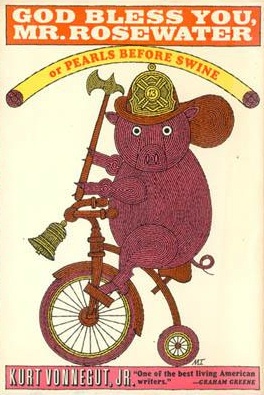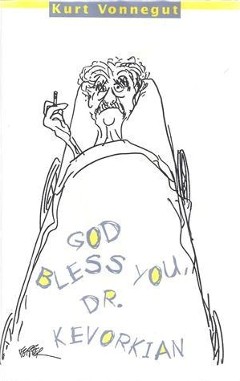Related Research Articles

Kurt Vonnegut was an American author known for his satirical and darkly humorous novels. He published 14 novels, three short-story collections, five plays, and five nonfiction works over fifty-plus years; further collections have been published since his death.

Theodore Sturgeon was an American fiction author of primarily fantasy, science fiction, and horror, as well as a critic. He wrote approximately 400 reviews and more than 120 short stories, 11 novels, and several scripts for Star Trek: The Original Series.

Slaughterhouse-Five, or, The Children's Crusade: A Duty-Dance with Death is a 1969 semi-autobiographic science fiction-infused anti-war novel by Kurt Vonnegut. It follows the life experiences of Billy Pilgrim, from his early years, to his time as an American soldier and chaplain's assistant during World War II, to the post-war years. Throughout the novel, Billy frequently travels back and forth through time. The protagonist deals with a temporal crisis as a result of his post-war psychological trauma. The text centers on Billy's capture by the German Army and his survival of the Allied firebombing of Dresden as a prisoner of war, an experience that Vonnegut endured as an American serviceman. The work has been called an example of "unmatched moral clarity" and "one of the most enduring anti-war novels of all time".
"Harrison Bergeron" is a satirical dystopian science-fiction short story by American writer Kurt Vonnegut, first published in October 1961. Originally published in The Magazine of Fantasy and Science Fiction, the story was republished in the author's Welcome to the Monkey House collection in 1968.

Breakfast of Champions, or Goodbye Blue Monday is a 1973 novel by the American author Kurt Vonnegut. His seventh novel, it is set predominantly in the fictional town of Midland City, Ohio, and focuses on two characters: Dwayne Hoover, a Midland resident, Pontiac dealer and affluent figure in the city, and Kilgore Trout, a widely published but mostly unknown science fiction author. Breakfast of Champions deals with themes of free will, suicide, and race relations, among others. The novel is full of drawings by the author, substituting descriptive language with depictions requiring no translation.

The Sirens of Titan is a comic science fiction novel by Kurt Vonnegut Jr., first published in 1959. His second novel, it involves issues of free will, omniscience, and the overall purpose of human history, with much of the story revolving around a Martian invasion of Earth.

Player Piano is the debut novel by American writer Kurt Vonnegut Jr., published in 1952. The novel depicts a dystopia of automation partly inspired by the author's time working at General Electric, describing the negative impact technology can have on quality of life. The story takes place in a near-future society that is almost totally mechanized, eliminating the need for human laborers. The widespread mechanization creates conflict between the wealthy upper class, the engineers and managers, who keep society running, and the lower class, whose skills and purpose in society have been replaced by machines. The book uses irony and sentimentality, which were to become hallmarks developed further in Vonnegut's later works.

God Bless You, Mr. Rosewater, or Pearls Before Swine, Kurt Vonnegut's fifth novel, was published in 1965 by Holt, Rinehart and Winston and as a Dell mass-market paperback in 1970. A piece of postmodern satire, it gave context to Vonnegut's following novel, Slaughterhouse-Five and shared in its success.

Welcome to the Monkey House is a collection of 25 short stories written by Kurt Vonnegut, published by Delacorte in August 1968. The stories range from wartime epics to futuristic thrillers, given with satire and Vonnegut's unique edge. The stories are often intertwined and convey the same underlying messages on human nature and mid-twentieth century society.

God Bless You, Dr. Kevorkian, by Kurt Vonnegut, is a collection of short fictional interviews written by Vonnegut and first broadcast on WNYC. The title parodies that of Vonnegut's 1965 novel God Bless You, Mr. Rosewater. It was published in book form in 1999.
Kilgore Trout is a fictional character created by author Kurt Vonnegut (1922-2007). Trout is a notably unsuccessful author of paperback science fiction novels.

Jailbird is a novel by Kurt Vonnegut, published in 1979. The book is regarded as Kurt Vonnegut's "Watergate novel."

Mark Vonnegut is an American pediatrician and author. He is the son of writer Kurt Vonnegut. He is the brother of Edith Vonnegut and Nanette Vonnegut. He described himself in the preface to his 1975 book as "a hippie, son of a counterculture hero, BA in religion, genetic disposition to schizophrenia."

Bagombo Snuff Box is a collection of 23 short stories written by Kurt Vonnegut. The stories were originally published in US periodicals between 1950 and 1963, and consisted of virtually all of Vonnegut's previously published short fiction of the 1950s and 60s that had not been collected in 1968's Welcome to the Monkey House. This collection was published in 1999 by G. P. Putnam's Sons.
Palm Sunday is a 1981 collection of short stories, speeches, essays, letters, and other previously unpublished works by Kurt Vonnegut.
"Welcome to the Monkey House" is a Kurt Vonnegut short story that is part of the collection of the same name. It is alluded to in God Bless You, Mr. Rosewater as one of Kilgore Trout's stories.
A mnemonic is a memory aide.
Fortitude is a one-act play written by Kurt Vonnegut in 1968, and broadly based on Mary Shelley's 1818 novel Frankenstein; or, The Modern Prometheus. The brief [19 page] play addresses the issues of robotics and the ethical dilemmas of cyborg's rights. It was featured in the anthologies, Human-Machines: An Anthology of Stories About Cyborgs and The Ultimate Frankenstein. The story was also featured in the 1991 made-for-cable-TV anthology Kurt Vonnegut's Monkey House.

While Mortals Sleep is a collection of fifteen previously unpublished short stories by Kurt Vonnegut, and one that was previously published, released on January 25, 2011. It is the third posthumously published Kurt Vonnegut book, the first being Armageddon in Retrospect, the second being Look at the Birdie. The book begins with a foreword by Dave Eggers. Illustrations by Vonnegut himself appear throughout.

Sucker's Portfolio, by Kurt Vonnegut, is a collection of six short stories, one non-fiction essay, and one unfinished short story written by Vonnegut and published posthumously by Amazon Publishing. The collection was initially made available in episodes as a Kindle Serial on November 20, 2012. The complete book was later released on March 12, 2013.
References
- 1 2 Farrell, Susan (2009). Critical Companion to Kurt Vonnegut. Infobase Publishing. p. 245. ISBN 978-1-4381-0023-4.